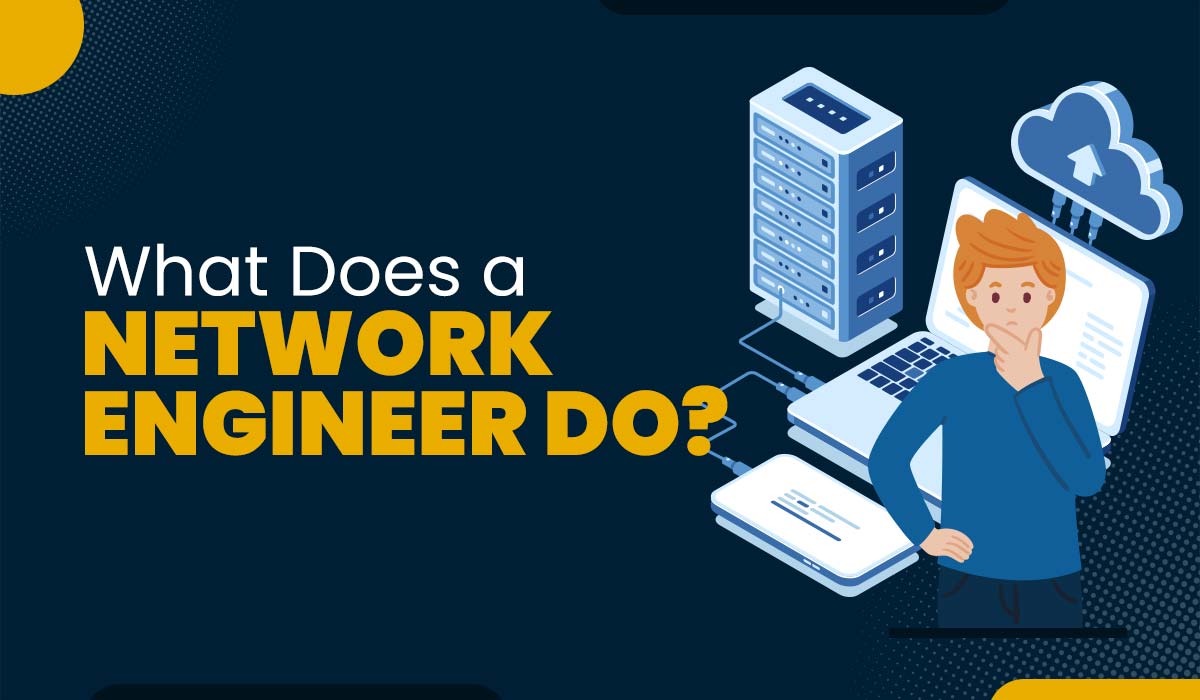What Does a Network Engineer Do?

If a business or organization wants its employees to be able to freely exchange information and resources, as well as maintain open lines of communication, they need a sophisticated network architecture. A network engineer is required to handle the network architecture. By reading this article, you will know the answer to the question, “what does a network engineer do?” A network engineer’s responsibilities include conceptualizing, implementing, diagnosing, and repairing network issues. Further, they aid other workers and staff in gaining access to the network, develop safety standards, and keep the network running smoothly. Network engineers pay particular attention to offering high-availability network infrastructure to support users’ online and offline information technology tasks. Network engineers commonly collaborate with other positions, such as computer network architects or security systems engineers, and they can work both inside and outside of a company, as independent consultants. Moreover, Network engineers have to create and implement network setups, address performance issues, monitor networks, and set up firewalls and other security measures. To debate and make decisions regarding overall business goals, policies, and network status updates, they frequently report to a CIO, chief information security officer, and other line-of-business officials. Network engineers frequently collaborate closely with other engineers and project managers, manage capacity, and provide remote or on-site support. Here are a few typical network engineer roles and responsibilities – To better comprehend what does a network engineer do, let’s delve further into the 3-tiered support model in technology. Service may be broken down into tiers or levels to better accommodate its consumers. As a result, a three-tiered framework is often used as a basis for assistance, and network engineers play a vital role in it. The daily base tasks and responsibilities of network engineers vary depending on the employer and the specific role. They perform various tasks to ensure that the network is running properly. The major responsibilities of a network engineer are given below: Let’s start with understanding L1 Network Engineer Roles and Responsibilities and then move to the next level, L2 and L3 Network Engineer Roles. The service desk is the initial point of contact for users and network engineers. They should be able to handle a high proportion of queries without involving other IT departments. The help desk is staffed by generalists with basic-level expertise in various network technologies and applications. If they are unable to solve the problem, they will transfer it to Level 2. Approach: In order to help a client, a Level 1 network engineer must first learn about the customer and their problem. Those working in Level 1 tech support go beyond the obvious symptoms to diagnose the real issue. The network engineer representative has to know the customer’s end goal in order to analyse the symptoms properly. They have a certain period of time to fix most of the queries that people have brought to their attention. This is done so that effort is not squandered on treating symptoms rather than causes. Level 1 Capabilities: While Level 1 network engineers have a solid foundation in the product or service regarding networking, they may lack the expertise to address more advanced customer concerns. This team should be able to resolve 70-80 percent of problems without involving higher-level support. These are the basic L1 Network Engineer roles and responsibilities. Now it’s time to understand the same for L2 Network Engineers. The technical and application management teams make up Level 2 and have access to more expert personnel and more time to tackle the problem. When an issue is resolved at level 2, the service desk is alerted and follows up with the customer. If level 2 professionals are unable to fix the problem, the query is passed on to level 3 network engineers, who possess even more expertise in the field. Because of their superior knowledge, Level 2 is usually able to fix 20% of reported problems. Approach: Once experienced network engineers have received all the necessary information from level 1 support, they will begin working to resolve the problem within the specified time frame. Software fixes, diagnostic testing, and remote-control tools for taking over the user’s system to do troubleshooting and fix the issue are all examples of what fall under this category. Level 2 Capabilities: These are the L2 Network Engineer roles and responsibilities. Let’s see the roles and responsibilities of L3 Network Engineers. Level 3 is more infrastructure-focused. These will include system admins and engineers, network admins and engineers, database engineers, security engineers, and everything that is infrastructure-focused. A network engineer will be looking after the network of the company. They will be responsible for the day-to-day support of network devices, network infrastructure, or someone working on a project in a networking capacity. They will work closely with other system admins, system engineers, or IT managers. The network manager is responsible for managing, configuring, configuring, and designing all networking devices, such as routers, switches, firewalls, load balancers, and proxy links between office networks. Network engineer making sure it is monitored, updated, and secure. Approach: Any tier 2 query received by level 3 will be accepted, and a resource will be assigned to tackle the problem. When a customer’s problem has been fixed, level 3 informs the service desk and level 2 and then closes the ticket. At this stage, the most advanced troubleshooting tools for the most intractable problems are carried out by professional network engineers. Network Engineer Courses – Network engineers work in large to medium-sized and small enterprises and perform tasks such as designing, implementing, and maintaining the organization’s internal network infrastructure, IT support, and systems administration. They can work in various industries like healthcare, education, and research and perform their duties by maintaining and supporting the company’s network. Network engineers also work in government and military organizations and provide their services that assist in national defense and other important government functions. They perform their duties like designing, implementing, and maintaining secure networks of organizations. They provide network design, implementation, and troubleshooting services to various clients by working as consultants, contractors, or freelancers. To become a network engineer, a person needs specific skills to perform the duties and understand the given task. These skills are – These skills are acquired through training and validated by certifications. To enter the networking field, one needs to start with CCNA Training and move ahead as one like. A network engineer has to work with other IT teams to run the organization’s tasks smoothly. So, they need to have the ability to coordinate well with teams. A network engineer must have good communication skills to advance in their career. Analytical Skills come from experience; as long as a network engineer is working the problem and understanding everything from the seniors, they will grow their analytical skills. Network Engineers must also have leadership skills to become successful. As they move further in their career, they will have to manage teams and lead various tasks. These are the major skills required to be a network engineer. Now, we have taken a look at L3, L2, L1 network engineer roles and responsibilities, and the skills required to become a network engineer. Network engineer certifications and training are essential for professionals seeking a successful career in the field of networking. These certifications validate the knowledge and expertise of individuals in designing, implementing, and managing network infrastructure. Industry-recognized certifications such as Cisco Certified Network Associate (CCNA), Cisco Certified Network Professional (CCNP), Cisco Certified Internetwork Expert (CCIE), and CompTIA Network+ provide comprehensive training on network fundamentals, routing and switching, security, and troubleshooting. By acquiring these certifications, network engineers enhance their skills, increase their marketability, and gain a competitive edge in the job market. Ongoing training and certification renewal ensure that network engineers stay updated with the latest technologies and best practices, enabling them to adapt to the ever-evolving networking landscape. Depending on qualifications, level of experience, and location, an average network engineer income can range from $49,000 to more than $132,000 yearly, according to Glassdoor. According to Indeed, the yearly base pay for a network engineer in the United States is $87,000. Additionally, some organisations offer profit-sharing plans, and bonuses are also available to engineers. Although network engineers normally work 40 hours per week, they could also be required to work on weekends, in the evenings, or at other odd hours to fix technical issues. Within the networking industry, network engineers can choose from a variety of career routes. For instance, network analysts have a focus on the setup and upkeep of networks and frequently deal with both the technical and business sides of an organisation. The duty of network managers is similar, but they also have to oversee and train network technicians. In addition, the following jobs are ideal for someone with network engineering skills: A network engineer is someone who is familiar with all aspects of hardware infrastructure, computer networks, and other associated technologies. In order to authenticate their expertise, the sector needs a professional with specialisation training. So, in order to secure an employment as a network engineer, one needs plan out their learning process and identify their area of expertise. The following are the steps one can take to become a network engineer: So, we hope after reading this article, you have the answer to the question, “What does a network engineer do.” The basic roles of a network engineer include – Network engineers should have both Hard and soft skills to become successful network engineers. Hard skills include but are not limited to networking skills, analytical skills, and software skills. At the same time, Soft skills include communication, teamwork, leadership, etc. A network engineer’s daily tasks include checking network infrastructure for possible security threats, installing, supporting, configuring, and troubleshooting network devices, configuring various security measures to protect the network, improving network efficiency, and training juniors to conduct various networking tasks. The demand for network engineers in India is quite high. In India, the network engineering field is expanding rapidly, and graduate and undergraduate students increasingly favour it as a career path. In this industry, thousands of job openings perfectly match the rising number of network engineers in India. The availability of network engineers depends on the company, whether large, medium, or small. If we take the example of small companies, there will be no dedicated network engineer or dedicated system engineer. All the aspects, including the database and security, will be managed by the same person. He may also be responsible for the entire system, servers for storage, or data centers. Network engineers are crucial in better connectivity between subnetworks and provide a secure pathway toward a better digital presence. If you also want to become a successful network engineer or looking to upskill yourself to upgrade your post, you should check out PyNet Labs’ Job Guarantee Courses by clicking the link. Get a better understanding of PyNet Labs’ 100% Job Guarantee Program – If you want to know, how can you become a network engineer, you can follow this link: How to become Network Engineer? How can I Start My Career As a Network Engineer? – Deepanshu BudhijaIntroduction
What is a Network Engineer?
Network Engineer Roles and Responsibilities
What does a Network Engineer do on a daily basis?
What Does a Network Engineer Do?
L1 Network Engineer Roles and Responsibilities
L2 Network Engineer Roles and Responsibilities –
L3 Network Engineer Roles and responsibilities
CCNP DevNet TrainingWhere do Network Engineers Work?
Network Engineers’ Required Skills
Network Engineer Certification and Training
Network Engineers’ Salary
Career Prospects for network engineers
How to become a network engineer?
Frequently Asked Questions
Q1 – What is the role of a network engineer?
Q2 – What skills do network engineers need?
Q3 – What does a network engineer do on a daily basis?
Q4 – Is networking engineer a good career?
Conclusion







